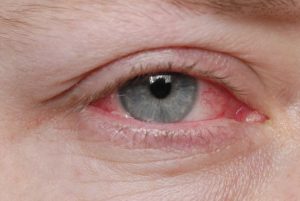Conjunctivitis, also known as red eye, is a common eye condition that can affect people of all ages. It occurs when the conjunctiva, which is the thin and transparent layer of tissue that lines the inner surface of the eyelid and covers the white part of the eye, becomes inflamed. The inflammation causes blood vessels in the conjunctiva to dilate, giving the eye a red appearance.
Conjunctivitis is a very common condition, with millions of cases reported each year. It can be caused by a variety of factors, such as bacteria, viruses, allergens, and irritants. People who wear contact lenses or have underlying health conditions like allergies or autoimmune disorders may also be more prone to developing conjunctivitis.
Conjunctivitis can be caused by several factors, including viruses, bacteria, allergens, and irritants. Viral conjunctivitis is the most
Bacterial conjunctivitis is usually caused by the same bacteria responsible for sinus and ear infections. Allergic conjunctivitis occurs when the conjunctiva becomes irritated by allergens such as pollen, dust, or pet dander. Irritant conjunctivitis can be caused by exposure to chemicals or foreign objects in the eye.
The main symptom of conjunctivitis is redness in the eye, which can be accompanied by other symptoms such as:
In viral and bacterial conjunctivitis, the discharge may be thicker and more pus-like. Allergic conjunctivitis typically causes intense itching and watery discharge.
There are several factors that can increase your risk of getting conjunctivitis, including:
The treatment for conjunctivitis depends on the cause of the inflammation. Viral conjunctivitis usually resolves on its own within a week or two without any specific treatment. Bacterial conjunctivitis can be treated with antibiotic eye drops or ointment.
Allergic conjunctivitis can be managed with over-the-counter or prescription antihistamine eye drops.
In addition to medication, there are some self-care measures that can help alleviate symptoms and promote healing, such as:
While mild cases of conjunctivitis can be treated at home, it is important to consult an eye doctor if you experience severe symptoms or if your symptoms do not improve within a few days. Your eye doctor can properly diagnose the cause of your conjunctivitis and provide appropriate treatment.
In addition, if you wear contact lenses, it is important to seek medical attention as soon as possible to prevent any complications or potential damage to your eyes.
Remember, prompt and proper treatment is essential in managing conjunctivitis and preventing it from spreading to others.
If you experience symptoms of conjunctivitis, it is important to consult with an eye care professional for a proper diagnosis and treatment plan. With prompt and appropriate care, conjunctivitis can be effectively managed, and your eyes can return to their healthy state.
If left untreated, conjunctivitis can lead to complications such as corneal ulcers or scarring, which can affect your vision. It may also spread to the other eye or to other people through close contact.
Therefore, it is important to seek proper treatment and follow any recommended hygiene practices to prevent the infection from spreading further.
Remember, early detection and treatment can help minimize the discomfort and potential complications associated with conjunctivitis. Don’t hesitate to seek medical attention if you suspect you have this condition.
Regular eye exams are crucial for maintaining good eye health and detecting any potential issues early on. This is especially important for those with a family history of eye diseases or underlying health conditions that can affect the eyes.
In addition to proper hygiene and avoiding irritants, incorporating healthy habits into your daily routine, such as eating a balanced diet, staying hydrated, and getting enough sleep, can also help support your overall eye health.
In addition to the physical aspect, taking breaks from screen time and protecting your eyes from harmful UV rays are also important for maintaining healthy vision.
Furthermore, wearing appropriate eye protection when engaging in activities that pose a risk of eye injury, such as playing sports or working with power tools, can help prevent serious eye problems.
Taking care of your eyes is crucial for maintaining good vision and overall health. Here are some simple tips that can help you keep your eyes healthy:
Taking care of your eye health is an essential part of maintaining a healthy lifestyle. By being informed about common eye conditions like conjunctivitis and taking steps to prevent and treat them, you can ensure that your eyes remain in good shape for years to come.
Remember, your eyes are an important part of your body and deserve proper care and attention. By staying informed and taking proactive steps to maintain good eye health, you can prevent or manage various eye conditions, such as conjunctivitis, and ensure clear vision for years to come. So, make sure to prioritize your eye care and consult with Dittman Eyecare if you have any concerns or experience any symptoms.